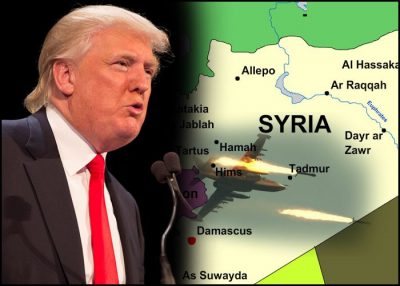Escalation of Tensions in Syria: One Month after the Chemical Attack in Khan Sheikhoun
Global Research News Hour Episode 179

“I will tell you, what happened yesterday is unacceptable to me,…And I will tell you, it’s already happened that my attitude toward Syria and Assad has changed very much.” – U.S. President Donald Trump (April 6, 2017) [1]
LISTEN TO THE SHOW
On Thursday March 30th, US Ambassador to the United Nations, Nikki Haley, assured reporters the Trump administration was no longer focused on removing the Syrian Head of State from power.
This policy stance shifted 180 degrees less than a week later following an April 4th incident involving dozens of deaths in Khan Sheikhoun attributed by Syrian opposition sources to a deliberate chemical weapons attack by the Assad government. President Trump explained that the killing of “innocent children, innocent babies — babies, little babies — with a chemical gas that is so lethal” inspired him to rethink his approach to dealing with the Syrian President, and ultimately to fire 59 Tomahawk Missiles on the air base from which the chemical gas attack was allegedly launched.
Far from being outraged at this violation of international law, mainstream media talking heads erupted with applause of the Commander-in-Chief’s actions. Opinion polls finally tipped in his favour, and even opposition politicians found occasion to commend him for his actions.
No comparable ‘presidential’ acts of moral indignation were in evidence a week later when over one hundred children evacuated from Syrian opposition-held villages were murdered in cold blood by a terrorist bombing in Rashideen. In fact, with the exception of a few alternative news outlets, the incident has been virtually erased from public consciousness.
Likewise, dissident perspectives casting doubts about President Assad’s deliberate bombing of his own citizens with chemical weapons, in spite of the lack of a rational motive (on the eve of a major peace conference in Brussels) are mocked in the mainstream press.
Does the tragic deaths of ‘beautiful babies’ ring true in this instance as a pre-text for military action? Or was this a ‘Wag the Dog‘ maneuver to prop up an ongoing assault on the Trump presidency? These questions are at the core of this week’s episode of the Global Research News Hour.
First up, we will hear from Ray McGovern, a representative of the group Veteran Intelligence Professionals for Sanity, about the problematic (lack of ) intelligence informing the Trump administration’s policy on reprisal for the chemical agent deaths. McGovern also looks at the coincidence between the president’s stance on Syria, and the shake-up of his cabinet, beginning with the departure of his first National Security Advisor Mike Flynn.
We then hear an interview with Patrick Henningsen, recorded by Chris Cook of radio station CFUV 101.9 FM in Victoria for the program Gorilla- Radio. Henningsen, who was on the ground in Syria in April, further elaborates on the problems with the April 4th chemical agents attack, talks about the Rashideen Massacre which he investigated hours after it happened, and the problematic media coverage of both incidents.
Finally, we hear never before heard audio from an interview with Mahdi Nazemroaya, recorded April 1st. This interview contextualizes the attacks by the Turkish government on Kurdish positions in Syria and Iraq near the end of April. Nazemroaya’s analysis touches on Turkey’s shifting allegiances in recent years and its evolving attitude toward Kurds.
Ray Mcgovern is a former U.S. Army Intelligence/Intelligence and past CIA analyst. He is a representative of the group ‘Veteran Intelligence Professionals for Sanity’ which has published two reports critical of the Official ‘Assad did it’ line regarding Assad’s use of chemical weapons.
Patrick Henningsen is a writer, investigative journalist, and filmmaker and founder of the news website 21stCentury Wire.com.
Mahdi Nazemroaya is a research associate with the Centre for Research on Globalization (CRG). He specializes on the Middle East and Central Asia. He has been a contributor and guest discussing the broader Middle East on numerous programs and international networks such as Al Jazeera, Press Tv, and Russia Today. His writings have been published in more than ten languages. He also writes for the Strategic Culture Foundation (SCF) in Moscow, Russia.
LISTEN TO THE SHOW
The Global Research News Hour airs every Friday at 1pm CT on CKUW 95.9FM in Winnipeg. The programme is also podcast at globalresearch.ca . The show can be heard on the Progressive Radio Network at prn.fm. Listen in everyThursday at 6pm ET.
Community Radio Stations carrying the Global Research News Hour:
CHLY 101.7fm in Nanaimo, B.C – Thursdays at 1pm PT
Boston College Radio WZBC 90.3FM NEWTONS during the Truth and Justice Radio Programming slot -Sundays at 7am ET.
Port Perry Radio in Port Perry, Ontario –1 Thursdays at 1pm ET
Burnaby Radio Station CJSF out of Simon Fraser University. 90.1FM to most of Greater Vancouver, from Langley to Point Grey and from the North Shore to the US Border.
It is also available on 93.9 FM cable in the communities of SFU, Burnaby, New Westminister, Coquitlam, Port Coquitlam, Port Moody, Surrey and Delta, in British Columbia, Canada. – Tune in at its new time – Wednesdays at 4pm PT.
Radio station CFUV 101.9FM based at the University of Victoria airs the Global Research News Hour every Sunday from 7 to 8am PT.
CORTES COMMUNITY RADIO CKTZ 89.5 out of Manson’s Landing, B.C airs the show Tuesday mornings at 10am Pacific time.
Cowichan Valley Community Radio CICV 98.7 FM serving the Cowichan Lake area of Vancouver Island, BC airs the program Thursdays at 6am pacific time.
Campus and community radio CFMH 107.3fm in Saint John, N.B. airs the Global Research News Hour Fridays at 10am.
Caper Radio CJBU 107.3FM in Sydney, Cape Breton, Nova Scotia airs the Global Research News Hour starting Wednesday Morning from 8:00 to 9:00am. Find more details at www.caperradio.ca
Notes:
- Jeff Mason and Tom Perry (April 6, 2017), ‘Trump says chemical attack in Syria crossed many lines’, Reuters; http://www.reuters.com/article/us-mideast-crisis-syria-idlib-idUSKBN1770YU

